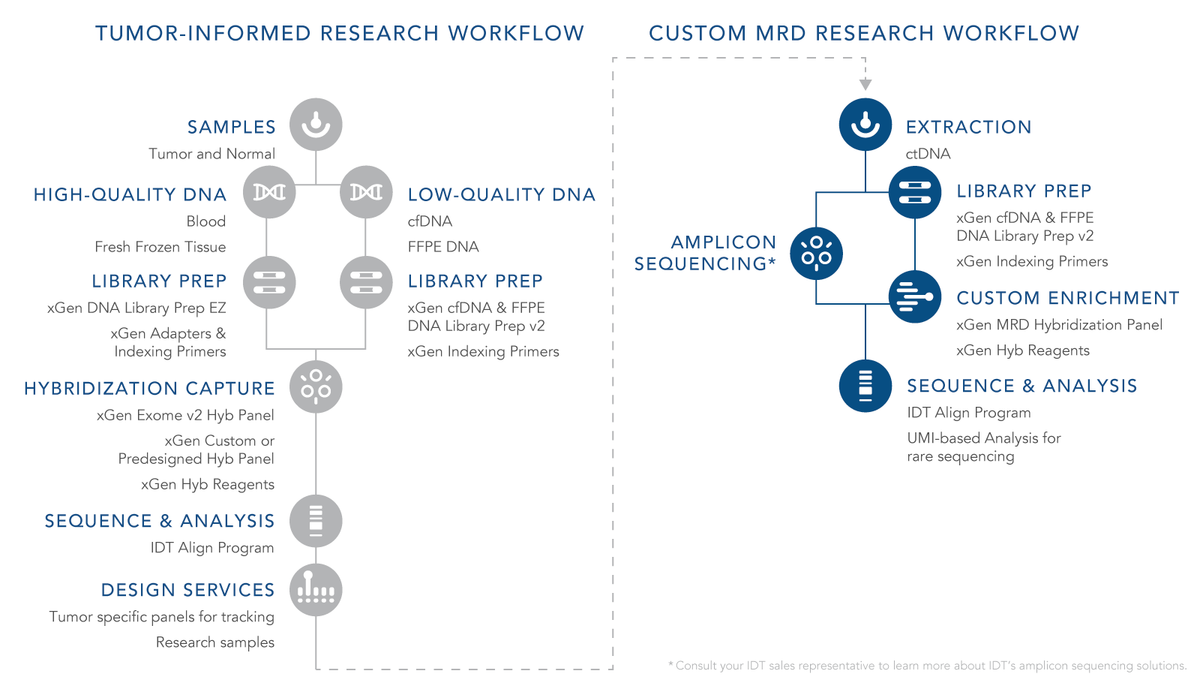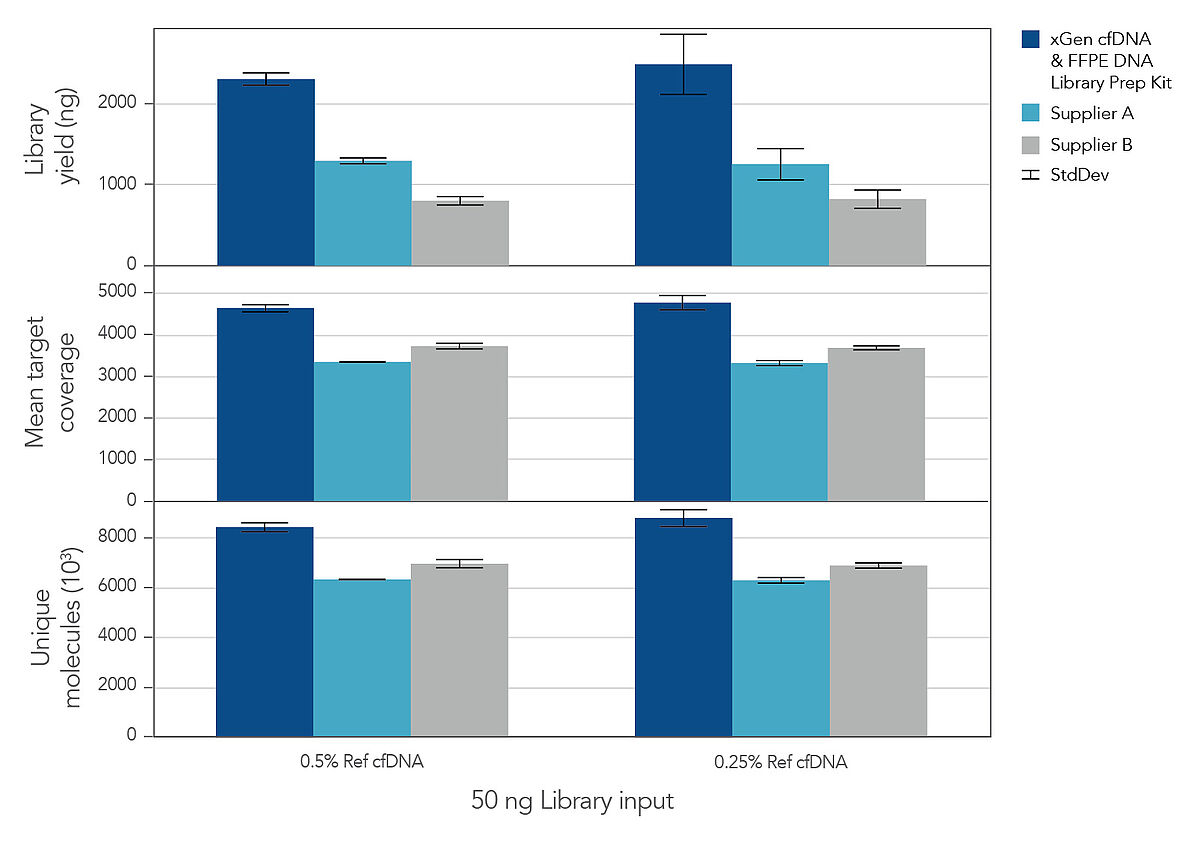Minimal residual disease (MRD) research
Tomorrow’s cancer research breakthroughs are on the horizon. The xGen MRD solution offers a complete sample preparation workflow including custom MRD hybridization capture panels delivered quickly and affordably.
- More complete workflow—curated workflow for custom MRD hybridization research panels
- Turnaround time— only 5 business days from when order is placed
- Flexible panel size—target tumor-specific variants using up to 2000 probes per panel and order up to 50 panels at once
- Affordable MRD research—xGen MRD Hybridization Panels deliver an affordable custom solution
- Rare variants—identify variants at ≤1% variant allele frequency (VAF) with your custom panel
- Automation friendly—easy workflow that can be automated for high-throughput applications
- PCR analysis options—oPools™ Oligo Pools accommodate multiplexed PCR workflows for MRD research
Minimal residual disease (MRD) refers to the presence of cancer at low levels [1]. MRD research using NGS requires a full solution that encompasses initial variant discovery from individual tumors followed by custom target enrichment of those variants from low-abundance cell-free DNA (cfDNA) to identify the presence of circulating tumor DNA (ctDNA), indicative of MRD.
IDT offers a tumor-informed research workflow that first utilizes a custom or predesigned panel that has a broader target region to identify variants that are representative of each specific cancer (Table 1). Our panels are designed to reduce off-target binding while maximizing coverage for identifying variants in research samples. For more information, see The xGen Off-Target Quality Control (QC) Method increases accessible probe design space for hybridization capture when compared to the repeat annotation based QC method.
Table 1. Tumor-informed research workflow.
| Step | Benefits | ||
|---|---|---|---|
| Samples | Tumor and Normal | ||
| Extraction | Blood or Fresh Frozen Tissue | cfDNA or FFPE DNA | |
| Library prep | xGen™ DNA Library Prep Kit EZ | xGen™ cfDNA & FFPE DNA Library Prep Kit v2 | Flexible library preparation kits for MRD sample types |
| Target enrichment | Create an xGen™ Custom Hyb Panel or use one of the IDT Predesigned Hyb Panels, such as the xGen™ Exome v2 Hyb Panel or the xGen Hyb Reagents | Hybridization probe design minimizes off-target capture | |
| Sequence & Analysis | IDT Align℠ Program | Partner with a known sequencing facility to give you the results | |
The identified variants then form the basis for a customized tumor-specific xGen™ MRD Hybridization Panel that can be designed, synthesized, and shipped within 5 business days from when order is placed. The recurrent use of this panel with deep sequencing can support researchers in assessing the potential presence or absence of biomarkers at ultra-low frequency (Table 2).
Since each panel is used to identify the small fraction of ctDNA within a cfDNA sample, a high conversion rate is essential for the library preparation step. With the xGen cfDNA & FFPE DNA Library Preparation Kit, which empowers variant identification from low-input cfDNA research samples, low-level MRD-specific mutations can be investigated using customized MRD Panels. Enrichment of the specific biomarkers using a custom xGen MRD Hyb Panel furthers the identification of ultra-low variants by focusing the library to a small target space for the required deep sequencing.
Table 2. Custom MRD research workflow.
| Step | Benefits | |
|---|---|---|
| Design | Tumor-specific panel design | Order up to 50 unique panels at once |
| Library prep | xGen cfDNA & FFPE DNA Library Prep Kit v2 | High conversion rate |
| Target enrichment | xGen MRD Hyb Panel(s) | Enrich sequencing reads to known tumor-specific mutations for deep sequencing and identification of ultra-low variants |
| Sequence & Analysis | IDT Align Program | Partner with a known sequencing facility to give you the results |
As an alternative, IDT also offers oPools™ Oligo Pools that support multiplex PCR workflows for MRD research. oPools Oligo Pools include up to 20,000 pooled oligonucleotides that can be from 40–350 bases in length. These panels can be used to generate amplicon sequencing libraries for MRD research (see the workflow graphic).
Variant discovery with a tumor-informed workflow followed by the xGen Custom MRD Workflow
Researchers use biomarkers to track ctDNA found in circulating cfDNA, and/or formalin fixed paraffin embedded (FFPE) samples to research cancer. Initial analysis involves identifying the specific somatic variants found in a sample. Common MRD research approaches for identifying such variants involve preparing libraries from extracted cfDNA and FFPE, then performing hybridization capture using larger custom or predesigned panels with a broad number of targets to find unique signatures for each research sample. This approach is used during the early research stage and discovery phase to identify somatic and germline mutations, but due to the larger size of the panel and associated sequencing depth required, it is not used to identify ultra-low variants in MRD research samples.
For rare variant discovery, IDT offers an xGen Custom MRD Workflow to assist you in your MRD research needs. Easily prepare high complexity libraries from extracted cfDNA using the xGen cfDNA & FFPE DNA Library Prep Kit. For target enrichment and accurate ultra-low variant identification, design your xGen MRD Hybridization Panels with up to 2000 probes per panel and order up to 50 panels at once. These customizable panels can enable reliable variant identification at ≤1% variant allele frequency (VAF) if input cfDNA quantity and sequencing depth requirements are met (see Table 3).
Comprehensive conversion and error correction enables ultra-low variant identification with cell-free DNA
The unique, single-stranded ligation strategy of the IDT xGen cfDNA & FFPE DNA Library Prep Kit and workflow delivers high conversion of input DNA molecules to sequencing data. This high conversion rate is critical for identification of ultra-low frequency variants, which is common in the analysis of cfDNA samples. A higher conversion rate translates to higher complexity and coverage than other DNA library prep kits for cfDNA (Figure 1). In addition, the xGen cfDNA & FFPE DNA Library Prep Kit includes adapters that contain unique molecular identifiers (UMIs), which enable bioinformatic error correction. Combining higher complexity and coverage with stringent error correction better enables the identification of ultra-low frequency variants (Table 3). For target enrichment, two different custom panels containing a target size of 61 kb (Figure 1), or 180 kb (Table 3) were designed and utilized in the data shown.
Table 3. xGen cfDNA & FFPE DNA Library Prep Kit identifies low frequency variants in NGS reference samples.
| Mutation | Expected VAF (%) | xGen cfDNA & FFPE DNA Library Prep MC Kit* | Library kit A* | Library kit B* |
|---|---|---|---|---|
| EGFR: L858R | 0.25 | 0.13 (3/3) | 0.21 (3/3) | 0.21 (3/3) |
| EGFR: E746-A750 | 0.25 | 0.11 (3/3) | 0.19 (3/3) | 0.12 (3/3) |
| EGFR: T790M | 0.25 | 0.29 (3/3) | 0.36 (3/3) | 0.12 (3/3) |
| KRAS: G12D | 0.32 | 0.33 (3/3) | 0.36 (3/3) | 0.33 (3/3) |
| NRAS: Q61K | 0.32 | 0.23 (3/3) | 0.31 (2/3) | 0.22 (3/3) |
| NRAS: A59T | 0.32 | 0.17 (3/3) | 0.43 (2/3) | 0.22 (3/3) |
| PIK3CA:E545K | 0.32 | 0.16 (3/3) | 0.11 (3/3) | 0.36 (3/3) |
*Libraries were prepared in triplicate from 50 ng input Horizon cfDNA reference standards using the xGen cfDNA &FFPE DNA Library Prep MC Kit in addition to two other commercially available library prep kits. Libraries were then captured with a 180 kb (target space) xGen Custom Hyb Panel targeting seven identified SNPs using the using the xGen Hybridization and Wash v2 Reagents and Beads. Captured libraries were pooled and sequenced on a NextSeq 500 (Illumina), using a high output 300 cycle kit and the manufacturer's protocol. After subsampling to 85M total reads, the average variant allele frequency for each of the targeted mutations was calculated for each library prep kit using VarDict.
Figure 1. xGen cfDNA & FFPE DNA Library Prep MC Kit delivers higher yields, complexity, and coverage. Libraries were prepared in triplicate according to the manufacturer’s instructions with 50 ng of Horizon cfDNA reference standard and 7 cycles of PCR. Following quantification, libraries were captured with a 61 kb (target space) xGen Custom Hyb Panel using the xGen Hybridization and Wash Kit. Captured libraries were pooled and sequenced on a NextSeq 500 (Illumina) using a high output 300 cycle kit and the manufacturer's protocol. After subsampling to 85M total reads, coverage and complexity were calculated.
References
- Thierry AR, El Messaoudi S, Gahan PB, et al. Origins, structures, and functions of circulating DNA in oncology. Cancer Metastasis Rev. 2016;35(3):347-376.
For research use only. Not for use in diagnostic procedures. Unless otherwise agreed to in writing, IDT does not intend for these products to be used in clinical applications and does not warrant their fitness or suitability for any clinical diagnostic use. Purchaser is solely responsible for all decisions regarding the use of these products and any associated regulatory or legal obligations.


